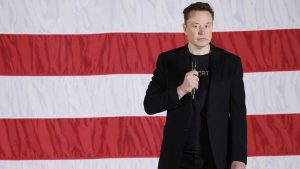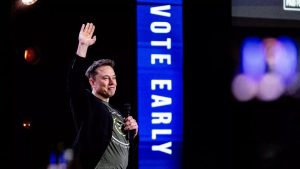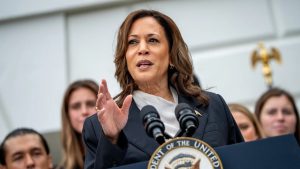From Garbage Labels to Political Rhetoric: Puerto Rico’s Role in Trump’s Campaign Rally
USA NEWS – At a rally held at Madison Square Garden, Donald Trump showcased a spectacle that turned into a controversial display of rhetoric and public sentiment as he gears up for the final stretch of his campaign. With just over a week remaining until Election Day, the event, originally intended as a platform for his closing message, quickly devolved into a platform for crude and inflammatory remarks directed at key Democratic figures and communities.
The rally featured a line-up of speakers who hurled derogatory comments at various targets. Notably, stand-up comedian Tony Hinchcliffe ignited outrage with his assertion that Puerto Rico is a “floating island of garbage.” This remark came amidst a series of crude jokes that were offensive to numerous demographic groups, including Latinos, Jews, and African Americans—constituencies critical to both parties in the upcoming election. Hinchcliffe’s comments drew swift backlash from Kamala Harris’s campaign, which is vying for support from Puerto Rican communities in battleground states like Pennsylvania. Shortly after the rally, Puerto Rican superstar Bad Bunny publicly endorsed Harris, highlighting the backlash against Hinchcliffe’s comments.
In an unusual move, Trump’s campaign distanced itself from Hinchcliffe’s remarks, with senior advisor Danielle Alvarez stating, “This joke does not reflect the views of President Trump or the campaign.” Yet, other speakers at the rally continued the trend of incendiary rhetoric. Trump’s childhood friend, David Rem, labeled Harris “the Antichrist,” while businessman Grant Cardone accused her of being involved with “pimp handlers,” painting a derogatory image of the Vice President. Such comments echoed a familiar pattern in Trump’s campaign, where personal and racially charged attacks are often employed against opponents.
The event turned into a surreal gathering, featuring an eclectic mix of personalities from various realms of entertainment and politics, including former professional wrestler Hulk Hogan, television psychologist Dr. Phil McGraw, and former Fox News host Tucker Carlson. As the rally began to unfold, Trump arrived more than two hours late, following an introduction by his wife, Melania Trump, whose rare public appearances have drawn attention in themselves.
Trump began his address with his usual rhetorical question: “Are you better off now than you were four years ago?” The crowd’s enthusiastic “No!” response underscored a shared sentiment of dissatisfaction that Trump sought to channel into a broader narrative of American recovery and resilience. “This election is a choice between whether we’ll have four more years of gross incompetence and failure, or whether we’ll begin the greatest years in the history of our country,” he proclaimed.
In a strategic attempt to broaden his appeal, Trump unveiled a new tax proposal aimed at caregivers, a demographic crucial to many voters who juggle responsibilities for aging parents while raising children—a situation Harris has highlighted. His proposal included ending taxes on Social Security benefits, tips, and overtime pay, appealing directly to older adults and blue-collar workers who are feeling the pinch of economic pressures.
Despite the provocative atmosphere, Trump’s narrative echoed familiar themes around immigration and foreign policy. He reiterated his commitment to harsh immigration measures, stating that on his first day back in office, he would end what he termed the “migrant invasion.” As the rally stretched into its second hour, some attendees began to leave, perhaps signaling fatigue with the lengthy address.
Elon Musk, who introduced Melania Trump, was a significant presence at the event, praised by Trump as “a genius.” Musk referenced Trump’s intent to appoint him to lead a government efficiency commission, a nod to the intertwining of politics and business that has characterized much of Trump’s tenure. Musk’s comments about the wastefulness of government expenditures resonated with Trump’s audience, eager for a message of fiscal responsibility and efficiency.
A recurring theme throughout the rally was the contentious relationship between Trump and the Democratic Party, exemplified by the fervor with which his allies attacked Democratic figures. The comparison drawn by some Democrats between Trump’s rally and a pro-Nazi rally held in the Garden in 1939 fueled heated exchanges among speakers. Trump’s attorneys responded defiantly to such comparisons, framing them as desperate tactics from opponents fearful of Trump’s influence.
Trump’s complicated relationship with New York City, the birthplace of his business empire, served as both a backdrop and focal point for his narrative. Despite facing legal challenges in the state, including felony charges related to business practices, Trump expressed a deep appreciation for New York. He reminisced about attending sporting events at Madison Square Garden, presenting a contrast to his usual portrayal of the city as plagued by crime and mismanagement.
As the rally concluded, the atmosphere shifted with the arrival of opera singer Christopher Macchio, who performed “New York, New York.” Trump, alongside his wife, smiled and swayed to the music, a moment of levity after an event characterized by inflammatory remarks and political posturing.
The rally encapsulated the polarization of American politics, reflecting both Trump’s enduring support and the deep divisions within the electorate. As he seeks to regain traction in a landscape marked by uncertainty, the fallout from such remarks may play a crucial role in shaping public perception and voter turnout in the days leading up to the election. The narrative crafted at Madison Square Garden serves as a reminder of the complexities at play in this pivotal moment in American politics, with the stakes higher than ever as both parties vie for the allegiance of a diverse and increasingly fractured voter base.
As Trump embarks on the final leg of his campaign, the emphasis on familiar themes, coupled with provocative commentary, signals a strategy aimed not just at solidifying his base but also at appealing to undecided voters. The events at Madison Square Garden illustrate a campaign strategy that intertwines performance and politics, reflecting the dual nature of Trump’s public persona as both a disruptor and a traditional candidate seeking to reclaim the White House.



